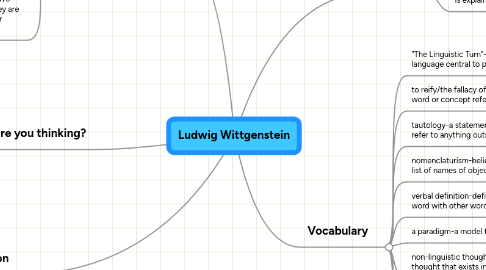Ludwig Wittgenstein
by brittany carrazco


1. OstensiveDefinitions
1.1. Ostensive Definitions-defining a word by ppointing to an object.
1.2. According to Augustine and other traditional philosophers we learned the bulk of what we know through ostensive definitions.
1.2.1. To the traditional philosophers language and thought are separate and thought comes first.
1.3. Wittgenstein said that Augustine was wrong and that people must have language before they are able to express their thought.
1.3.1. To Wittgenstein
2. Introspection
2.1. The traditionalist believed that introspection was like observation.
2.2. The traditional view of introspection is a comparison of observing an object in the outside world and my own thoughts and feelings about it.
2.3. Two differences between observation and introspection.
2.3.1. The object still exists whether or not I am looking at it or not.
2.3.2. When observing I do not change, produce or destroy the actual object where as when i introspect I can.
3. What are you thinking?
3.1. You cannot perceive a thought.
3.1.1. Therefore there are no defining characteristics of a thought.
4. Colors
4.1. We do not have visual sensations of separate colors.
4.1.1. The break in colors comes by the differences of language, in one language they will recognize three where as in another language they would recognize more colors.
